
- We will send in 10–14 business days.
- Author: Douglas W Oard
- Publisher: Now Publishers
- Year: 2013
- Pages: 156
- ISBN-10: 1601986785
- ISBN-13: 9781601986788
- Format: 15.6 x 23.4 x 0.8 cm, minkšti viršeliai
- Language: English
- SAVE -10% with code: EXTRA
Reviews
Description
E-discovery refers generally to the process by which one party (for example, the plaintiff) is entitled to discover evidence in the form of electronically stored information that is held by another party (for example, the defendant), and that is relevant to some matter that is the subject of civil litigation (that is, what is commonly called a lawsuit). Information Retrieval for E-Discovery describes the emergence of the field, identifies the information retrieval issues that arise, reviews the work to date on this topic, and summarizes major open issues. Information Retrieval for E-Discovery is an ideal primer for anyone with an interest in e-discovery; be it researchers who first practiced law but now study information retrieval, or those who studied information retrieval but now practice law.
EXTRA 10 % discount with code: EXTRA
The promotion ends in 22d.15:55:17
The discount code is valid when purchasing from 10 €. Discounts do not stack.
- Author: Douglas W Oard
- Publisher: Now Publishers
- Year: 2013
- Pages: 156
- ISBN-10: 1601986785
- ISBN-13: 9781601986788
- Format: 15.6 x 23.4 x 0.8 cm, minkšti viršeliai
- Language: English English
E-discovery refers generally to the process by which one party (for example, the plaintiff) is entitled to discover evidence in the form of electronically stored information that is held by another party (for example, the defendant), and that is relevant to some matter that is the subject of civil litigation (that is, what is commonly called a lawsuit). Information Retrieval for E-Discovery describes the emergence of the field, identifies the information retrieval issues that arise, reviews the work to date on this topic, and summarizes major open issues. Information Retrieval for E-Discovery is an ideal primer for anyone with an interest in e-discovery; be it researchers who first practiced law but now study information retrieval, or those who studied information retrieval but now practice law.


Reviews